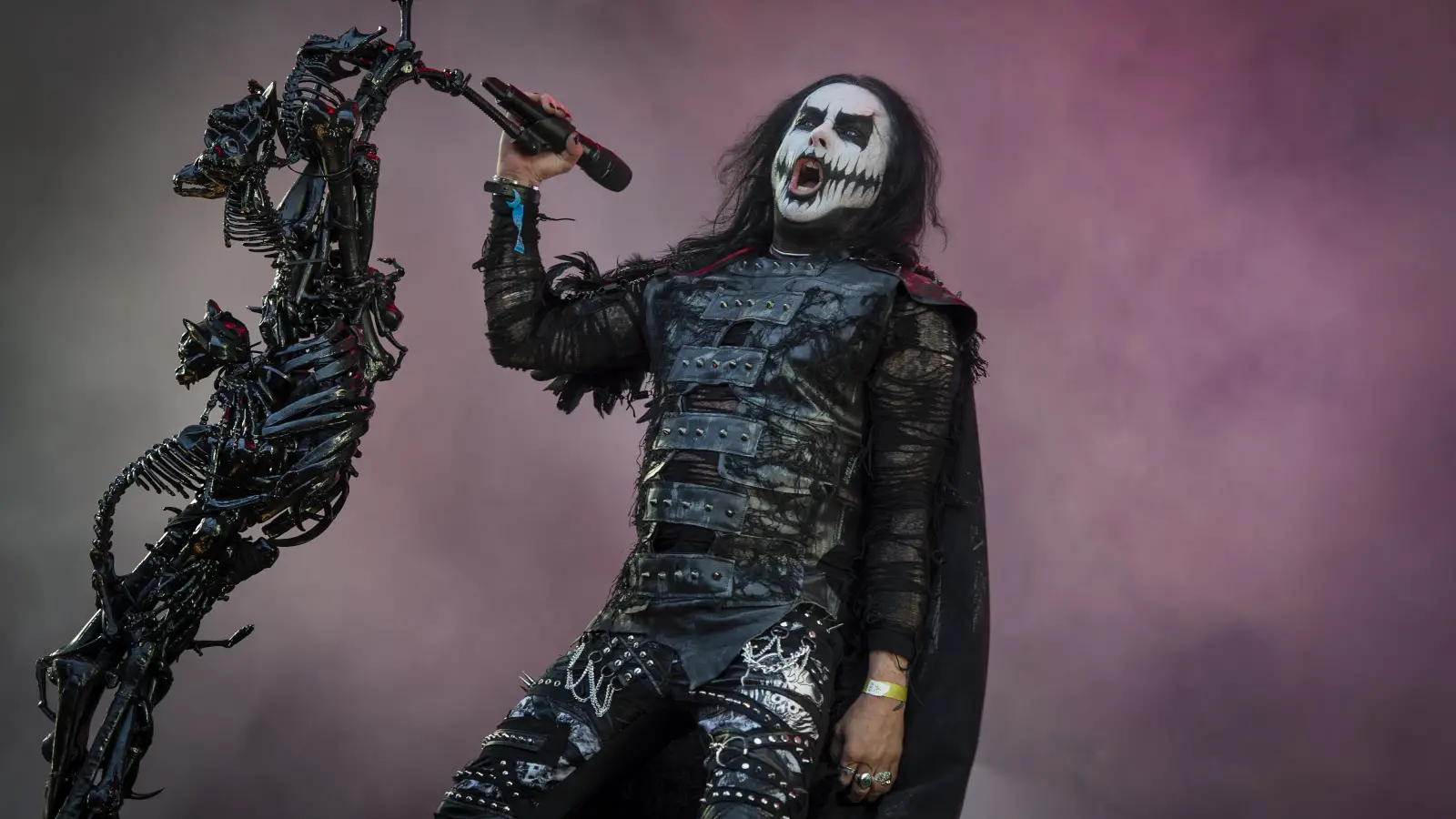
All images courtesy of Adrenaline PR
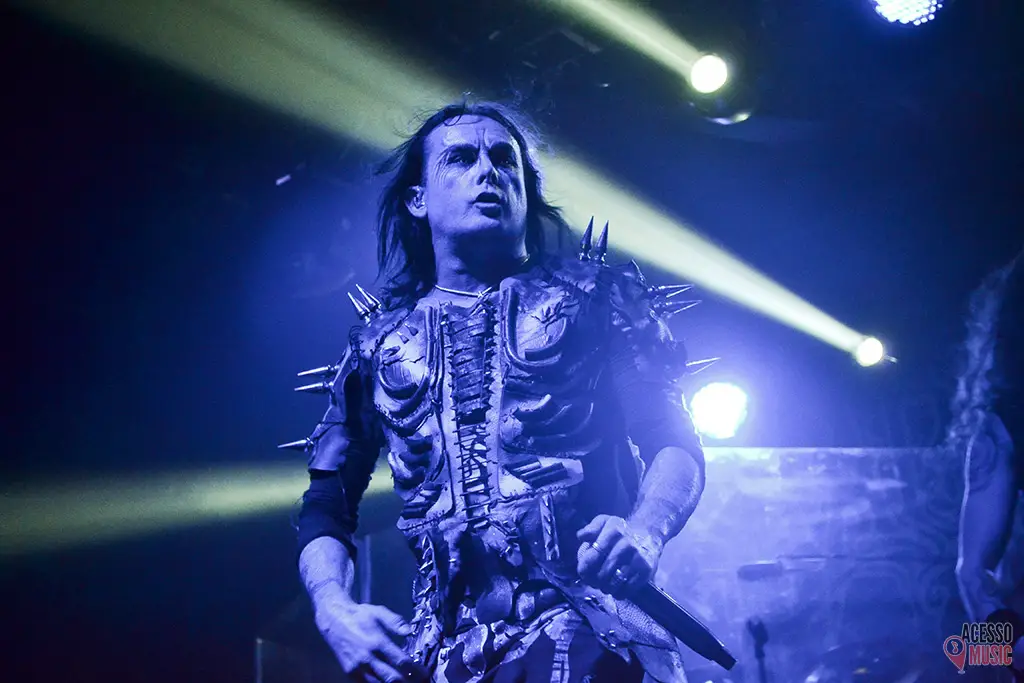
Recently, we caught up with veteran singer and singular Metal talent, Dani Filth. Among other things, we touch on what he’s been up to during the lockdown, his origins in music, Cradle Of Filth’s newest music, and a whole lot more.
If you would like to learn more about Cradle Of Filth, a link to the band’s webpage can be found here. Once you’ve checked those out, dig into this interview with Dani. Cheers.
Andrew:
Dani, thank you so much for being here with us today, how have you been these past couple of years? It looks like you’ve been busy working on and promoting your new album Existence Is Futile.
Dani:
Yes, that’s correct, we’ve been working on that, and touring for it. It’s been great.
Andrew:
So speaking of touring, you just played Bloodstock in August, right?
Dani:
Yeah, absolutely. We just undertook a full American tour as well. We were fortunate in respect of the fact that we were one of four bands this year that actually managed to get through the tour without anybody acquiring COVID. Although both supporting acts did, resulting in one not coming back to the tour at all, and the second ended up leaving the tour for ten days. So, obviously, we were having to circumnavigate troublesome waters when it came to the Americas. But it was great to be out on the road. Bloodstock was amazing as well. It was one of the few British festivals that actually went ahead. They tried running Donington at low capacity, but all the bands were shit anyway. Bloodstock was amazing though, and it was great to see everybody there. Everybody from the bands to the store owners, to security. Everybody just had a big grin on their face the whole weekend. It was amazing.
Andrew:
You recently did your own takeover of Gimme Metal. How did that go, what was it like?
Dani:
It was surprisingly fun. I’m kind of new to all this. I’ve been doing a bunch of interviews across four different streaming platforms, and it’s just been really tricky because I have a room set up here, and each one has a different format, so I have to keep moving everything about, and when it comes to all these new-fangled online radio things I’m not a massive fan, but I actually really enjoy Gimme Metal. Gimme Radio is actually very cool. The format was cool. They’re playing cool music. I had a whale of a time, and actually, they edited all my introductions to the songs, and all the tracks I’ve picked into a really agreeable format. It was really well done. The people there are really nice. I’d love to do it again!
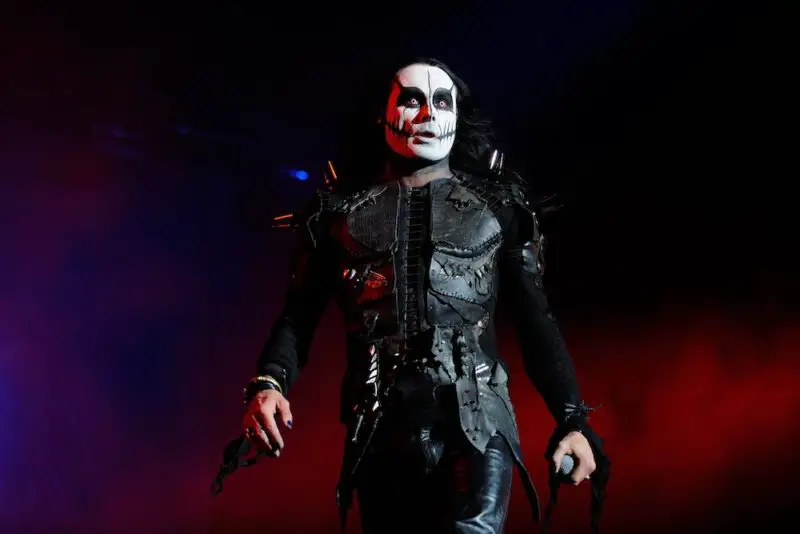
Andrew:
Let’s take it back to how it all started for you. What was your musical upbringing?
Dani:
Well, my dad was a Reggae record collector. He used to have people around the house smoking questionable substances while listening to Reggae. My mum was really into music as well, just listening to you know, Pop music, and then I grew into music. I was given a record player with 80s Pop classics right at the beginning of the 80s and then progressed to darker Pop like Ultravox and Gary Newman. Then, I discovered Metal via a friend at school, and never looked back. In my high school, I was in Hardcore bands, Punk bands, a kind of Indie Skate Punk band, metal bands, and eventually, Cradle Of Filth.
Andrew:
Over here in the States, in the 80s, we had the whole Satanic Panic thing going on. Was that as prevalent in the UK? Did any of that influence your band and your music?
Dani:
I’ve always been influenced by the occult, and I’ve always been into Satanic bands. I grew up in a village in an area of England, that’s known as “witch county.” I still live in the witch county. but this village, Hadleigh, in particular, was known for its burning of Protestants and burning witches. The Witchfinder General often frequented the village as well back in the 15th century. I lived in a 15th-century house on the front. It was built in 1685 and I just grew up with all that. We had a kind of similar thing in modern-day witch hunts in the 80s, but it was more to do with video nasties, some of which are so tame now. The opening sequences of programs like The Walking Dead far out-shadow, out-weigh, and out-gross the original ones you could go to prison for. Now, you had the PMRC and everything over in America, we kind of embraced that over here…all the satanic stuff. Our government and our public health liaisons weren’t quite so severe in Europe.
Andrew:
Cradle Of Filth has seen a lot of members come and go through the years. Has it been difficult keeping your sound consistent throughout those member changes?
Dani:
Yeah, having said that, with every band, they play the same album over and over and over again. Albums are dictated by the environment, the time, the people involved — it’s an ever-changing scenario — you can never replicate the same album, it becomes contrived if you even dare to attempt to. Overall, we’ve kept our sound, and our style, and if it’s changed, it’s because we wanted it to change. People seem to forget that when new members come in, they’re not just picked off the street, they’re handpicked for their love of the music, and their style. There is a lot of criteria, and they obviously know the band — most of them are fans, so, you know, the new members tend to mesh in quite well. Also, you spend so much time together recording and touring, you can’t possibly not become integrated into the machine.
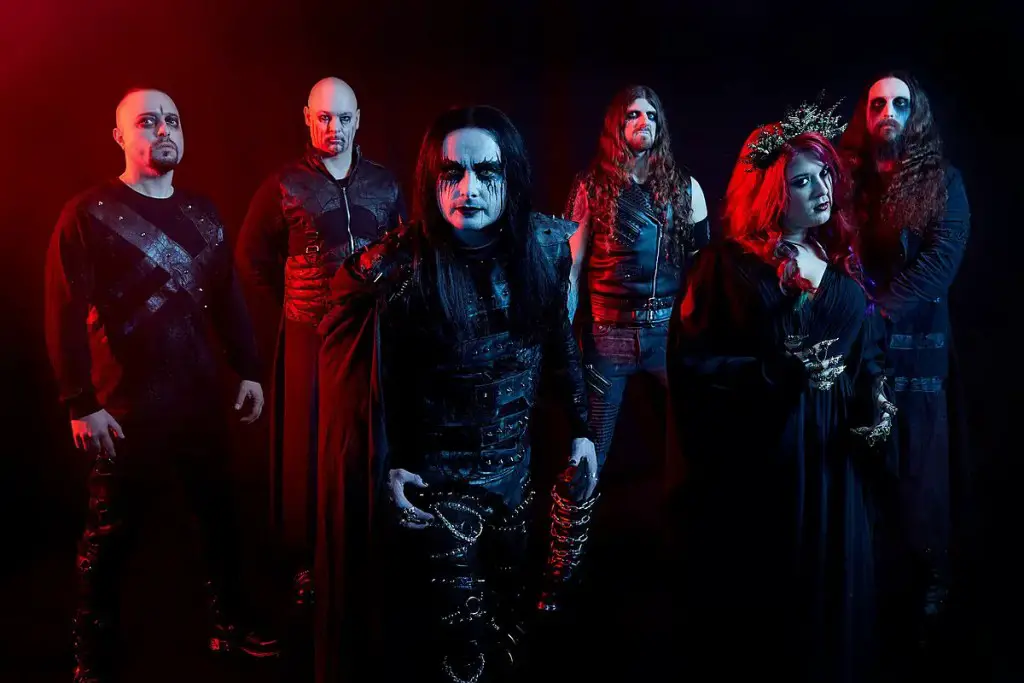
Andrew:
It’s kind of hard to place Cradle of Filth in a genre because you have stated before that you don’t call yourselves “Black Metal” anymore — you’re “Cradle Of Filth”, correct?
Dani:
I wouldn’t place myself in any genre, just the same as Iron Maiden and Metallica. You don’t define them by genre. Genre is only there to find your way around a record store, and there’s getting precious few of those left anymore. Now, I’d much rather just be known as, and correct people to just refer to us as “Cradle Of Filth” because as soon as you put a tag on a band, there are a million people just there to tear it down anyway and say, “No they’re not that.”
Andrew:
That’s completely understandable. When there was a genre shift from the 80s to the 90s from Glam, Metal, and Hair Metal to Grunge, was that easy to navigate through as the kind of band that you guys were at the time?
Dani:
When Grunge came along, it was just Punk again, but they gave it another name and another criterion for that particular moment in history around the beginning of the 90s. Metal was completely apart from the few bands like Guns N’ Roses, Metallica, and most of the Thrash bands died a slow death. If you look at the time period, a lot of Thrash bands tried, and a lot failed in experimenting with Grunge or just trying to be different to fit into that current scene.
So, Metal was pretty much driven underground, and that’s where the whole Death and Black Metal movement came from, it came out from the ashes of Thrash and we rode the coattails of that bearing in mind that I grew up on bands like Possessed, Whiplash, Slayer, and Razor. I was a massive Thrash Metal fan, and a massive US and UK Hardcore and Punk fan. I even loved Classic Metal, Traditional Metal, New Wave of British Heavy Metal, you name it. So, yeah, we rode the coattails of that resurgence. Around ‘91, ‘92, ‘93, when the next wave emerged into the public eye, we came along with it. We grew on the backs of the UK Doom scene as well as bands like Paradise Lost, Anathema, My Dying Bride, Decomposed, Putrefaction.
Then, there was the burgeoning Death Metal scene — Carcass, Terrible Fix — I’m talking English bands now, a lot of which had just come from the Hardcore scene. Napalm Death and Carcass were all Grindcore bands really to start with. We kind of cherry-picked the sound we want to, we had a bit of the British Doom about us, we had Black Metal, Death Metal, Soundtrack, Orchestration, Classical, New Wave of British Heavy Metal. We just wrote music that we liked, basically incorporating many of these elements.
Andrew:
Your live shows are very theatrical and there is a lot of horror and literature incorporated into your music. What are your favorite horror movies and books that you have taken inspiration from?
Dani:
Way too numerable to mention. I’m useless when it comes to putting the top-tens, or things like that together. The same goes for books and authors. I mean, it obviously plays a major part, I am a massive fan. We’d be here all day if I sat here and thought about my favorites.
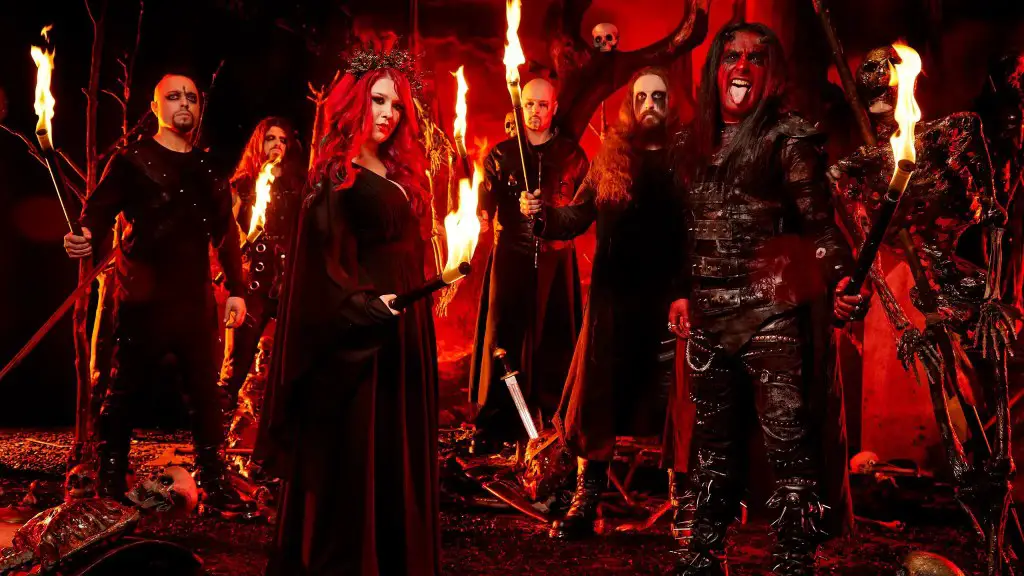
Andrew:
It’s hard to come up with on the spot like that, especially with the horror genre. So, what kind of equipment do you use live vs. in the studio?
Dani:
It’s generally different to record, and I can’t speak for the guitarists, but I know that on every album they go for different equipment. Live and studio are two different beasts altogether. I use a Neumann Cardioid mic in the recording studio, and live will be some kind of Shure wireless.
Andrew:
I wanted to talk about your appearance on Viva la Bam for a minute, too. You were on that back in the mid-2000s, right?
Dani:
Yeah! That was great fun. Bam was a close friend back then, and that week that I appeared on the show, I stayed at his house pretty much the whole week. One time, when he had to open an Element skateboard store in Times Square, in NYC, we took a limo down from Pennsylvania, stayed for a couple of days in New York, and partied like party animals. That was the first time I stayed with him for the weekend. It was amazing fun.
Andrew:
Where have some of your favorite places that your music has taken you?
Dani:
I’d say Japan’s my favorite. I always loved touring the States because it turns more into a tour of Walmarts with a few gigs thrown in between. [Laughs]. Summer festivals across Europe are amazing. I love Australia and New Zealand as well. South America is fantastic as well. In fact, I love touring the world. The more new experiences, the more far-flung, and different, the better. I love places where you can explore, like we had a day off in Ecuador, so we went to the equator, and walked up the mountain. In Mexico, went to visit lots of archaic pyramids. We try to get out and see the world. When we were in New Zealand, we went to Hobbiton, which is incredible. So, the further, more far-flung, and darker corners of our world the better.
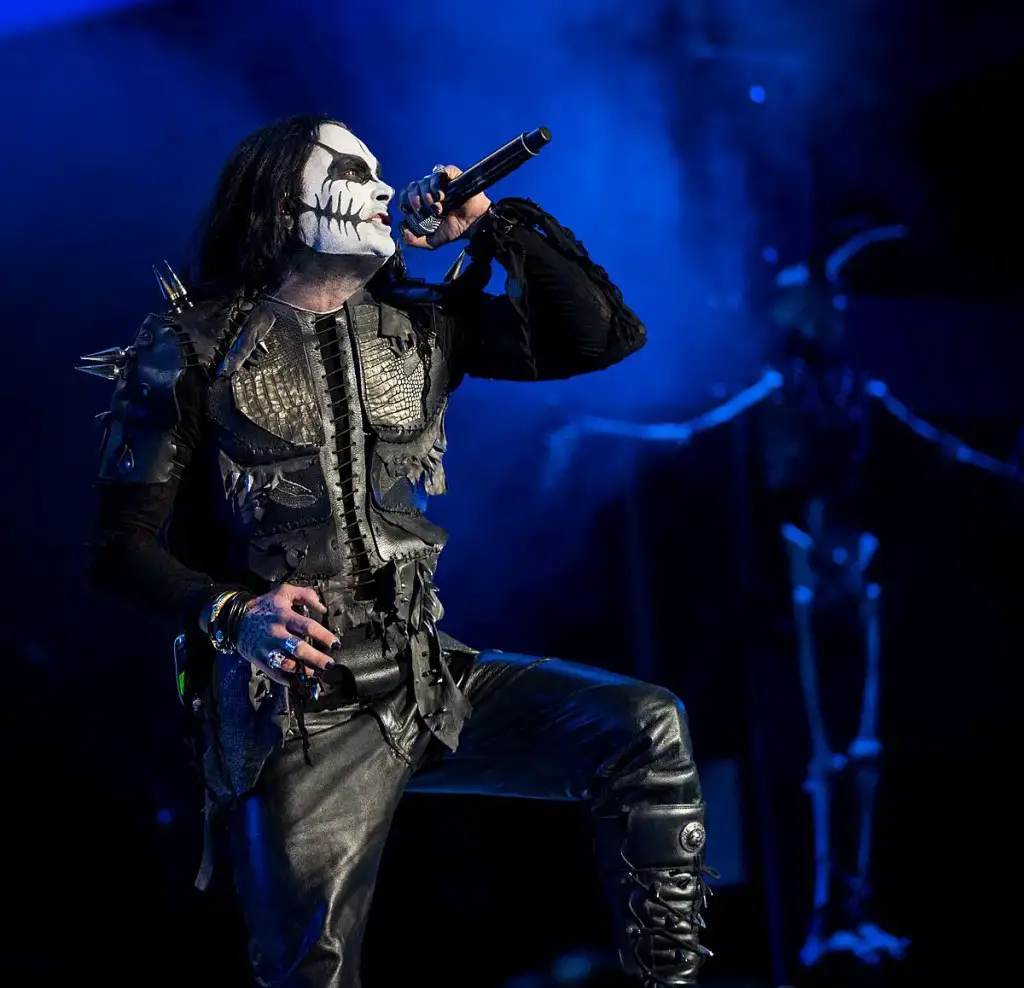
Andrew:
What was your first time here in the States like?
Dani:
I think the first one was Milwaukee Metal Fest back in 1997. Then, we had a four-date showcase shortly afterward. T was a lot of fun. I was celebrating my birthday on the day we played. I was actually talking about this to someone recently, trying to recap what happened, because I remember our drummer hanging me out of a window the night before because he was a bit of a bully. Then, hanging out on the curb the next day, in a hotel and they chose specifically The Ambassador because it was a room that Jeffrey Dahmer lured his victims to. So, we played in there, and hung out with Venom. It was a great time. It was a real eye-opener the first time you go anywhere.
Andrew:
Let’s talk about your vocal range because you’re very well known for that as well. Were you singing in choirs in school early on?
Dani:
I did for a little while. I tried playing violin for a while, then gave out. I was pretty good at it, but I gave it up because it wasn’t the sort of thing that was pursued. I went from a private school, which was very much one of those Hogwarts state schools to a comprehensive, which is lovely as well because it was out in the countryside, but with a different sort of people. Then I just went into various bands — Punk, Hardcore, Metal, and New Wave. Singing was my forte, more than anything else. I tried playing bass for a while but it didn’t really work out with singing. It’s just something that got developed. Here we are thirty years after landing myself, forming Cradle Of Filth, which is obviously at the end of all that youthful experimentation.
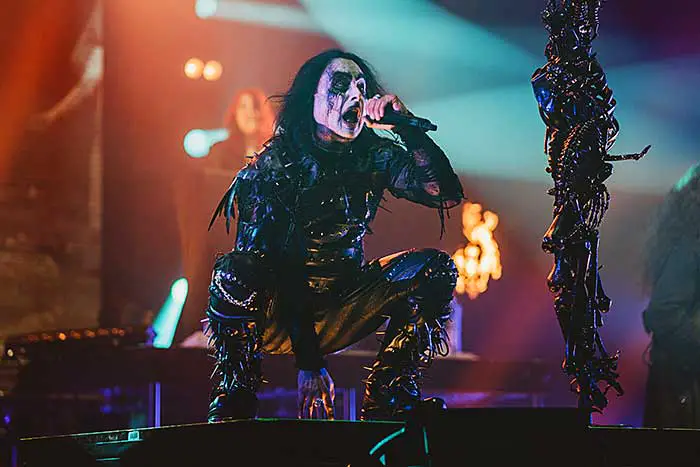
Andrew:
What are your warm-ups like before you start shows or recording? Your vocal style has got to take a big toll on you. Is it hard to keep that up?
Dani:
It’s actually quite the opposite. It really doesn’t. I mean, it is a struggle — Cruelty & The Beast is really hard. And it was hard when I was singing it back in 1998, let alone performing it now in 2021. Yeah, I mean, it does take its toll naturally, but I don’t warm up too much. I see some people that follow this regime, I won’t mention the person’s name, but everybody follows this woman’s regime. Unlike my vocal guy, who’s a throat manipulator, who stops you from getting stuck muscles. He’s like, “People who warm up for an hour, it’s like running a marathon before running a marathon.” So yeah, about five to ten minutes at tops. But before I go on tour, I’ll be rehearsing for maybe two weeks to get up to that level. When we first start the recording after Christmas, I always go back to the studio and go “Oh, my God, I despair. I’m fucking useless.” And then by the third time you’re in there, your voice just goes back into the way it was, and you just go “Oh, my God.” It’s like a slick vehicle after that, as opposed to being a burnt-out shell in someone’s garden.
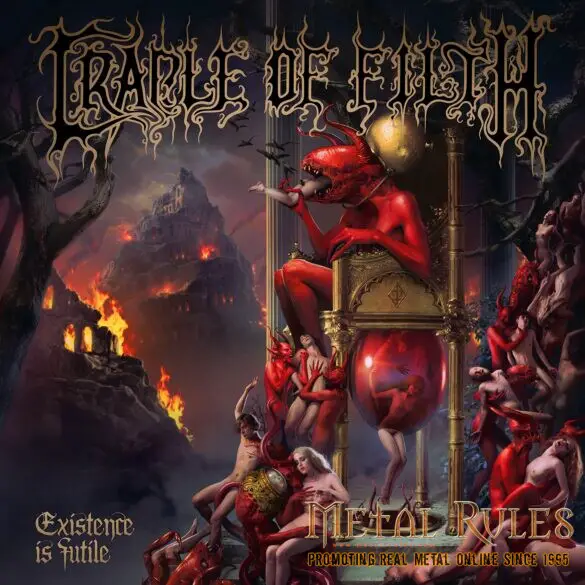
Andrew:
Do you collect any physical forms of music, like vinyl, cassettes, or CDs?
Dani:
Yes, CDs. I’ve got about three thousand, I think. I’m old school. I mean, digital obviously, I’ve got digital platforms. I don’t believe in Spotify. The reason I don’t believe in Spotify is that I think it’s criminal what they do. Last year, we had twenty million-plus plays on Spotify, and I got paid a little over $100. That’s pretty much like stealing. Now, just in the way in which people think music is a free thing because it’s not something you can physically touch, so maybe that’s why I’m still into my CDs. I put a CD in the car, and it will live there, basically because I’m probably too lazy to find where my CD player is. I get to appreciate music more because I literally digest the album as musicians write it — in order. I think the common online music aficionado is very flippant, “Listen to this song or listen to this.” I don’t think anybody listens to full albums anymore. My daughter certainly doesn’t. I’m still a big CD guy. I like to get it as people create it, with the visuals, and the artwork. I know it’s kind of destroying the planet’s resources, but it’s very small drop in the ocean compared to a lot of things.
Andrew:
Who does your artwork for the albums? The imagery and artwork are just amazing.
Dani:
Well, we have had a plethora of artists over the years. But the current artist who undertook the last three records is Arthur Berzinsh. He’s a Latvian contemporary artist who’s very well renowned. He is world-renowned, in fact. We’ve stuck with him for the last three albums because it’s been like a story arc. A release arc for us being a nuclear blast. And so, he undertook Hammer Of The Witches, Cryptoriana, and the current album, Existence Is Futile, and yeah, his work is amazing. So, only on the front cover, but I think per album, he does eight to nine different pieces. He also directed the video for “Heartbreak And Seance,” which in itself is a cinematic masterpiece. We’re very proud of working with such great talented person such as him.
Andrew:
Dani, thank you so much for your time. Is there anything else you’d like to say? What does the future look like from here for you?
Dani:
Obviously, our new album Existence Is Futile is out now. We have two really gloriously cinematic videos, “Crawling King Chaos” and a song called “Necromantic Fantasies” out there, and you can go check them out on YouTube. We’re currently undertaking a third video, which will be released in the new year for the song, “How Many Tears To Nurture A Rose.” We’re going to be doing a new live stream, which will be playing our album, Dusk And Her Embrace, in its entirety, plus a plethora of new songs, the new album, and various other ones which will be happening on Valentine’s Day if we get our shit together in time. We’ve got merchandise available at www.cradleoffilth.com. And you can follow me on Facebook and Instagram under the heading “Dani Filth.”
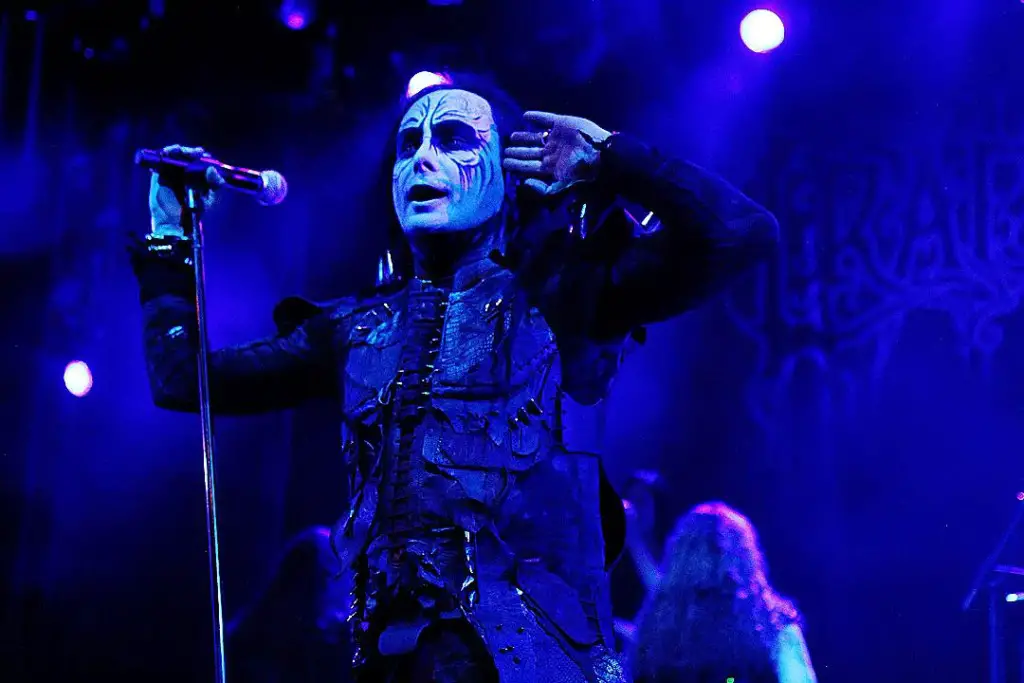
Interested in learning more about Cradle Of Filth? Check out the links below:
Be sure to check out the full catalog of VWMusic Interviews, by Andrew Daly, here: www.vinylwritermusic.com/interviews
